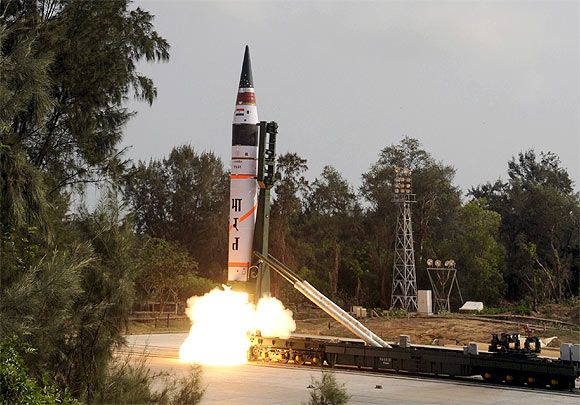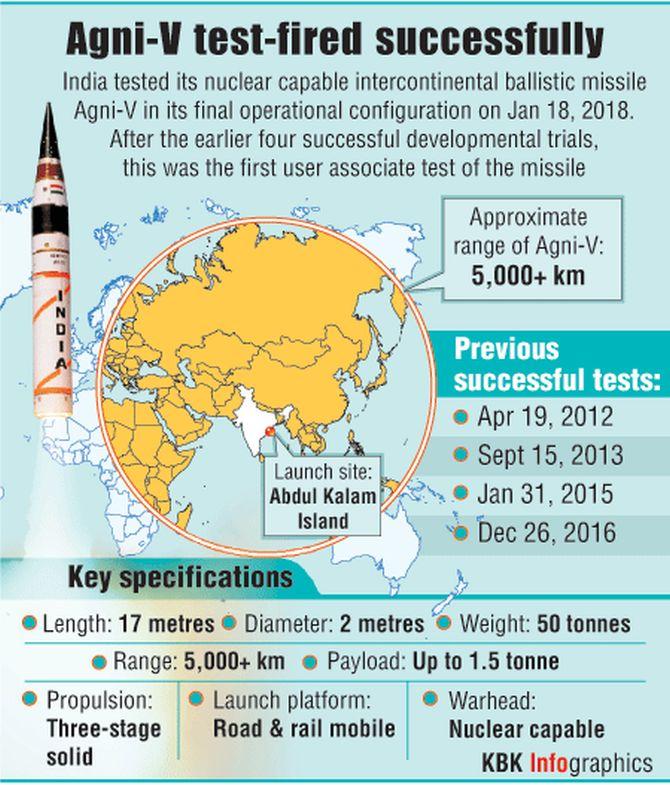
India on Thursday successfully test-fired its nuclear-capable surface-to-surface Agni-5 ballistic missile, having a strike range of over 5,000 km, from a test range off the Odisha coast.
The most-advanced missile of the Agni series was fired a canister launcher, mounted on a mobile platform, at about 9.53 am from number four launch pad of the Integrated Test Range in Abdul Kalam Island, defence sources said.
Describing the trial as 'fully successful', the sources said, the sophisticated missile travelled for 19 minutes and covered 4,900 km.

This was the fifth test of the missile and the third consecutive one from a canister on a road mobile launcher. All the five missions have been successful.
The flight performance of the missile was tracked and monitored by radars, range stations and tracking systems all through the mission. All objectives of the mission have been successfully met, the sources said.
"After four successful developmental trials, this was the first user associate test of Agni-5 missile," they said, adding today's success reaffirms India's indigenous missile capabilities and further strengthens its credible deterrence.
Defence Minister Nirmala Sitharaman expressed her happiness over the successful flight test of Agni-5 and congratulated the Defence Research and Development Organisation.
She also lauded the industries which contributed toward the manufacture of indigenous technologies that went into the making of the missile, a defence release said.
Chairman of the DRDO and secretary, Department of Defence Research and Development, Dr S Christopher congratulated the Agni-5 team and said the fifth consecutive successful test was a major boost to country's defence capabilities.
Agni-5 has new technologies incorporated in it in terms of navigation and guidance, warhead and engine, the sources said. It has a range of over 5,000 kilometres.
"The very high-accuracy ring laser gyro-based inertial navigation system (RINS) and the most modern and accurate micro navigation system (MINS) ensured the missile hit the target point with high accuracy.
"The high speed onboard computer and fault-tolerant software guided the missile flawlessly," a DRDO official said.
The missile is so programmed that after reaching the peak of its trajectory, it will turn towards the Earth to continue its journey towards the target with an increased speed due to gravitational pull, he said.
The first two successful flights of Agni-5 in 2012 and 2013 were in open configuration.
The third, fourth and today’s launch from a canister, integrated with a sophisticated mobile launcher, were in its deliverable configuration that enables launch of the missile with a very-short preparation time as compared to an open configuration.
It also has advantages of higher reliability, longer shelf-life, less maintenance and enhanced mobility, the official said.
Agni series comprises Agni-1 with 700-km range, Agni-2 with 2000-km range and Agni-3 and Agni-4 having ranges between 2,500 km to more than 3,500 km.
The first test of Agni-5 was conducted on April 19, 2012, the second on September 15, 2013, third on January 31, 2015 and fourth trial on December 26, 2016 from the same base.
Thursday's launch operations were led by Project Director, Agni-5, G Ramaguru and Programme Director, Agni, M R M Babu.
Scientific Adviser to Defence Minister and Director General, Missiles and Strategic Systems Dr G Satheesh Reddy witnessed the launch.
Directors of DRDO labs - ASL, DRDL, ITR, RCI and TBRL - reviewed the entire launch operations. Senior officials from the armed forces were also present.









 © 2025
© 2025